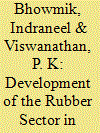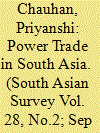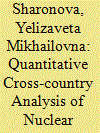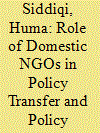|
|
|
Sort Order |
|
|
|
Items / Page
|
|
|
|
|
|
|
| Srl | Item |
| 1 |
ID:
180254


|
|
|
|
|
| Summary/Abstract |
Enclaves are the most distressed areas in the world where the ray of development hardly reaches. This study aims to evaluate the progress in the development in Dahagram–Angarpota enclave of Bangladesh after the initiation of 24-h open corridor access through the Indian territory in 2011. The study reveals that after 24-h open access through the corridor, the enclave achieved substantial positive changes in all the five indicators, namely, economic, social and infrastructural, technological, health and demographic indicators. However, the achievement in the four influential factors of development such as income, wealth, poverty and food security are still below the national level. Binary logistic regression model identified a positive change in income–wealth index of households through the changes in corridor access, education, electricity supply, number of livestock and involvement with micro credit. In the process of raising income–wealth, achieving food security and alleviating poverty, this study has suggested some policy recommendations that would guide different development programmes in the area.
|
|
|
|
|
|
|
|
|
|
|
|
|
|
|
|
| 2 |
ID:
180253


|
|
|
|
|
| Summary/Abstract |
The development of the rubber sector in North East (NE) India in recent decades is an outcome of the government’s import substitution initiatives in the post-independence period. The article attempts to trace the process of evolution and development of the rubber sector in the region and observes that the adopted policies for rubber expansion had been framed under the narrow innovation system model, whereby the localised knowledge and learning, as well as practices, remained completely ignored in the promotion of the sector. The lack of region-specific rubber development strategies with appropriate linkages supported by institutional systems are the critical gaps that undermine the sustainable growth of the rubber sector in the NE region. Eventualities of the sort call for reinventing policies and programmes under the broad innovation system framework, so as to reap the advantages emanating from the integration of the region with the global market and facilitate greater diversification and sustainable growth of the rubber sector.
|
|
|
|
|
|
|
|
|
|
|
|
|
|
|
|
| 3 |
ID:
180252


|
|
|
|
|
| Summary/Abstract |
South Asia is the fastest growing region in the world and is experiencing increasing demand for energy. As a result, countries are witnessing an excessive reliance on fuel imports, making themselves vulnerable to external price volatility and compromising on energy security. Power trade in South Asia can meet the challenge of increasing energy demand owing to complementarities in resource endowments and peak demand. Power trade in South Asia has increased over the years but is below potential. However, there are various challenges due to lack of institutional structures and frameworks for developing regional power trade models. The examples of power integration models in Europe, that is, the Nordic power market, and in Southeast Asia, that is, power trade in the Greater Mekong Subregion (GMS), can provide useful lessons and international best practices for regional power trade to be replicated in the South Asian context. Based on this, the objective of this article is to evaluate the existing power trading mechanisms in South Asia, highlight the challenges to regional energy cooperation, outline the necessary instruments and catalysts to promote regional power trade in South Asia based on the case study of successful power trading arrangements, including the Nordic power market in Europe and the Greater Mekong Subregion (GMS) in Southeast Asia, draw on their experiences to identify key mechanisms and develop a template for greater regional cooperation in electricity in South Asia.
|
|
|
|
|
|
|
|
|
|
|
|
|
|
|
|
| 4 |
ID:
180249


|
|
|
|
|
| Summary/Abstract |
Nuclear power has always been a controversial issue since it was discovered as a source of power for civil use. Despite being a global phenomenon, nuclear power is viewed differently around the world, and consequently, different discourses have had different outcomes. This study does a comparative analysis of nuclear power discourses between India and Russia, two countries of distinct political systems. This study analyses the media coverage and content of the main discourse themes in India’s and Russia’s print media from March 2011 to March 2019. The study finds that in both countries, despite their different political set-ups, nuclear power discourse has a pro-nuclear character.
|
|
|
|
|
|
|
|
|
|
|
|
|
|
|
|
| 5 |
ID:
180251


|
|
|
|
|
| Summary/Abstract |
Pakistan is a fragile democracy repeatedly facing problems in the design and implementation of police reforms. The scholarship on public policy highlights the role of non-state actors like NGOs in improving policies, especially through policy transfer and diffusion. In 2002, Pakistan designed a police reform, PO 2002, through collaborative methods, and implemented it nationwide for a short time. Using process tracing within case study and interviews with key informants, this article evaluates the role of domestic NGOs in the design, implementation and change of PO 2002, with special focus on policy transfer and policy diffusion. The evidence collected showed that in 2000, the nascent NGOs lacked expert knowledge to make any contribution to policy transfer. Later, their absence from the implementation phase and faulty methods blinded them from unveiling the critical policy lessons and impeded their ability to play any credible role in future policy diffusion.
|
|
|
|
|
|
|
|
|
|
|
|
|
|
|
|
| 6 |
ID:
180250


|
|
|
|
|
| Summary/Abstract |
This study compares the state of city government service delivery for communities living in different areas with different level of affluence in Rajshahi City in Bangladesh. Based on the results of a qualitative study, we found a significant service disparity between the affluent and the poor communities. This disparity is due to the inability of the poor to hold service providers accountable, attributable to a lack of knowledge about services and a lack of social status. Lack of quality monitoring and a marked bias in the quality of interactions between the poor and the affluent contribute to the service disparity This disparity is largely invisible to the poor who, instead of comparing themselves with the affluent citizens, compare themselves with a similar class of people.
|
|
|
|
|
|
|
|
|
|
|
|
|
|
|
|
|
|
|
|
|